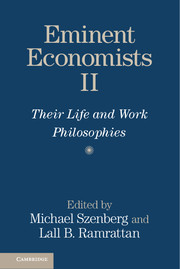Book contents
- Frontmatter
- Dedication
- Contents
- List of Contributors
- Foreword
- Preface and Acknowledgments
- Introduction
- 1 Being There: An Intellectual Journey
- 2 Social Norms in Economics and in the Economics Profession
- 3 Personal Reflections on My Professional Life
- 4 Gray Eminence?
- 5 Biochemist to Economist
- 6 Puzzles and Paradoxes: A Life in Applied Economics
- 7 Succeeding in Economics
- 8 My Research Strategy
- 9 My Philosophy of Economics, Life, and Everything (Not!)
- 10 Finding a Niche
- 11 Become an Economist – See the World
- 12 Practitioner of the Dismal Science? Who, Me? Couldn’t Be!!
- 13 One Job, Four Careers
- 14 My Life and Research Strategy
- 15 How I Ended Up Being a Multifaceted Economist and the Mentors I Have Had
- 16 Searching for My Personal Philosophy
- 17 Learning about the Evolving International Economy
- 18 Confessions of a Wellesley FEM
- 19 God, Ants, and Thomas Bayes
- 20 The Path of a Monetary Economist
- 21 Learning from the Field
- 22 Order in and through Disorder: The Invisible Hand as a Turbulent Regulator
- 23 The Education of an Economist
- 24 Faith, Science, and Religion
- 25 My Studies in International Economics
- 26 Sailing into the Wind
- 27 My Life and Work Philosophy
- 28 Scaling Fortress Economics
- 29 The Accidental Economist
- Index
- References
4 - Gray Eminence?
Published online by Cambridge University Press: 05 June 2014
- Frontmatter
- Dedication
- Contents
- List of Contributors
- Foreword
- Preface and Acknowledgments
- Introduction
- 1 Being There: An Intellectual Journey
- 2 Social Norms in Economics and in the Economics Profession
- 3 Personal Reflections on My Professional Life
- 4 Gray Eminence?
- 5 Biochemist to Economist
- 6 Puzzles and Paradoxes: A Life in Applied Economics
- 7 Succeeding in Economics
- 8 My Research Strategy
- 9 My Philosophy of Economics, Life, and Everything (Not!)
- 10 Finding a Niche
- 11 Become an Economist – See the World
- 12 Practitioner of the Dismal Science? Who, Me? Couldn’t Be!!
- 13 One Job, Four Careers
- 14 My Life and Research Strategy
- 15 How I Ended Up Being a Multifaceted Economist and the Mentors I Have Had
- 16 Searching for My Personal Philosophy
- 17 Learning about the Evolving International Economy
- 18 Confessions of a Wellesley FEM
- 19 God, Ants, and Thomas Bayes
- 20 The Path of a Monetary Economist
- 21 Learning from the Field
- 22 Order in and through Disorder: The Invisible Hand as a Turbulent Regulator
- 23 The Education of an Economist
- 24 Faith, Science, and Religion
- 25 My Studies in International Economics
- 26 Sailing into the Wind
- 27 My Life and Work Philosophy
- 28 Scaling Fortress Economics
- 29 The Accidental Economist
- Index
- References
Summary
Introduction
When the editors invited me to contribute an essay to Eminent Economists II: Their Life Philosophies, I found the adjective intimidating. My hesitance grew as I reviewed the list of contributors to the first Eminent Economists volume and reread their magnificent, moving essays. I wondered, “Why not Salient Economists? That I could live with.” My muse (a librarian and sometime bookseller) replied: “Yeah … just think how many copies that would sell!”
My title is an attempt to reduce the gap between expectations and results. But even this reframing of the task left me uncomfortable with the idea of writing about something as self-conscious as a life philosophy. Until recently unaware even of having had one, I doubted my ability to articulate one worth reading about. Besides, didn’t those who would be interested already know me well enough to infer what my philosophy must be?
Several factors made me agree to write the essay. First, the invitation came as I finished up a third of a century (literally thirty-three and a third years) at the University of California, San Diego, in preparation for starting a second job at Oxford. That seemed a salient time to summarize what I had learned about my profession. I also had a vivid memory of my colleague Sir Clive Granger, whose 2009 death prevented him from contributing to Eminent Economists II, at a UCSD gathering in his honor. He explained the even more ambitious turn his research had lately taken by saying, “Winning a Nobel Prize is one of those things that builds self-coni dence.” I thought, “What in the world are the other things?” When the invitation came I saw that it might be one – one that didn’t require anything as difficult as discovering cointegration.
- Type
- Chapter
- Information
- Eminent Economists IITheir Life and Work Philosophies, pp. 57 - 71Publisher: Cambridge University PressPrint publication year: 2014

